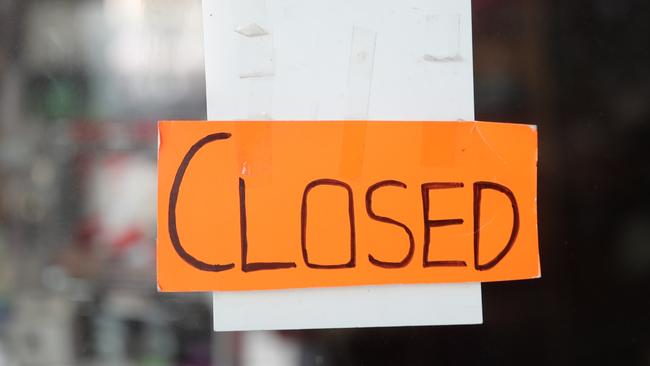Late payers raise red flags as latest liquidation figures revealed
Almost 60 Queensland companies shut down last month and there are concerns about the health of many others, with 9 per cent of firms unable to pay their bills on time. See the full list of insolvencies.

Business
Don't miss out on the headlines from Business. Followed categories will be added to My News.
Almost 10 per cent of Brisbane businesses are late in paying creditors as the impact of the Covid-19 pandemic places many in danger of going under.
New research by CreditorWatch shows that 9.9 per cent of businesses in the Brisbane CBD were taking more than 60 days to pay their bills on average. Overall about 9 per cent of businesses across Queensland were similarly late in paying creditors.
The ACT revealed the highest rate of arrears over the past 12 months, with 13 per cent of businesses taking more than 60 days to pay their bills on average. Businesses in NSW also scored poorly with 11 per cent of businesses in arrears.
Tasmania was the only state with less than nine per cent of SMEs in arrears, closely followed by Western Australia and South Australia.
CreditorWatch chief executive Patrick Coghlan said late payment was one of the “red flags” for companies heading towards insolvency.
But Mr Coghlan said the big banks and the Australian Taxation Office continued to take a lenient approach as businesses navigated hard times.
“They are basically hoping to nurture businesses back to health,” said Mr Coghlan. “Liquidations overall continue to be at historic lows.”
Construction remained the worst industry when it comes to businesses in arrears, often due to stalled project financing or delays.

The hospitality sector, which has historically been a high-risk industry but even more so due to the impact of Covid-19, also continued to suffer.
Mr Coghlan said Queensland’s exposure to the tourism sector meant many smaller restaurants and accommodation providers remained troubled.
“Queensland has not had a lot of domestic tourists and no international tourists over the past 18 months,” he said. “What we are finding now is that people from NSW and Victoria are booking holidays within their own states rather than in Queensland because they don’t want to get stuck if borders shut.”
“Though Queensland has seen a slight increase compared to last year, numbers are still very low,” said Mr Archer. “The companies we’ve seen proceed with liquidations this month have been dormant for some time, winding up to deal with unpaid tax debts.”
He said Queensland businesses in the most affected industries were looking to access new government grants and revised loan schemes to continue meeting trading obligations.
“The difficulty we see with this approach is that business owners providing personal guarantees for these loans are effectively transferring company liabilities to themselves,” he said. “This means that if their business doesn’t survive and their company enters an insolvency appointment, they’re still liable for the loan debts.”




